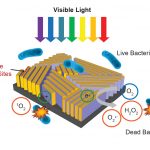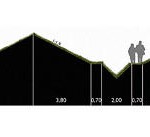Air pollution can make outdoor exercise toxic in big cities
Air pollution can make outdoor exercise toxic in big cities

A recent study of air pollution in larger cities has produced some startling results. Exercise is supposed to improve one’s health, but the evidence is showing it could actually be harmful in some areas.
An international team of scientists studied the health benefits of cycling and walking against the negative toll of air pollution. They documented air quality through average annual levels of PM2.5s and arrived at a tipping point – the amount of time after which exercising actually turns harmful to the health, due to breathing in fine particulates. In many large cities, including Delhi in India and Zabol in Iran, a mere 30 minutes of cycling can begin to damage one’s health.
See also: How to make air pollution measurement more accurate
“If you are beyond the break-even point, you may be doing yourself more harm than good,” explained Audrey de Nazelle, a lecturer at Imperial College’s Centre for Environmental Policy, and an author of the research project.
Air pollution located in big cities is getting worse. According to the World Health Organization, over 80% of citizens living in urban areas that track air pollution levels are exposed to air quality levels that exceed the WHO limit of 10μg/m3. Those most at risk live in cities with lower-income levels.
The medical conditions of people with asthma and emphysema are exacerbated by air pollution exposure. Respiratory disease, lung cancer, heart disease, and even damage to the brain, nerves, liver, or kidneys can be some of the long-term health issues caused by exposure to polluted air.
The countries with the most cities that have the worst air pollution include Iran, India, Saudi Arabia and China. The research found that western cities like New York, Los Angeles, Paris and London did not have air that was polluted enough to outweigh the positive effects of exercise.
But don’t give up on exercise
“The benefits of active travel outweighed the harm from air pollution in all but the most extreme air pollution concentrations,” added Nazelle.
“While this research demonstrates the benefits of physical activity in spite of air quality, it is not an argument for inaction in combating pollution,” said Dr James Woodcock from the Centre for Diet and Activity Research.
The issue of air pollution has become of interest to several companies who have produced environmental monitors like the upcoming Flow Air Quality Monitor. It is a small device that can be easily carried wherever one goes to monitor air quality in the area. Perhaps soon, we will have fitness trackers that offer this ability as well, so that excercise will not be impaired.
The post Air pollution can make outdoor exercise toxic in big cities appeared first on ReadWrite.
(16)









